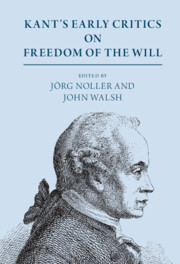Book contents
- Kant’s Early Critics on Freedom of the Will
- Kant’s Early Critics on Freedom of the Will
- Copyright page
- Contents
- Acknowledgements
- Note on the Edition and Translation
- Chronology of the Translated Texts and Kant’s Major Works
- Abbreviations
- Historical and Systematic Introduction
- I Freedom and Determinism
- II Freedom and Imputability
- Carl Christian Erhard Schmid, Lexicon for the Easier Use of the Kantian Writings, 2nd Edition, 1788
- Carl Christian Erhard Schmid, Attempt at a Moral Philosophy, Jena, 1790
- Johann Christoph Schwab, “On the Two Kinds of I, and the Concept of Freedom in Kant’s Ethics,” Philosophisches Archiv 1(1) (1792), 69–80
- Johann Christoph Schwab, “On Intelligible Fatalism in the Critical Philosophy,” Philosophisches Archiv 2(2) (1794), 26–33
- Karl Leonhard Reinhold, Contributions to the Correction of Previous Misunderstandings of Philosophers, Volume ii, Concerning the Foundation of Philosophical Knowledge, Metaphysics, Ethics, Moral Religion, and Doctrine of Taste, Jena, 1794
- III Freedom and Consciousness
- IV Freedom and Skepticism
- V Freedom and Choice
- Appendix: Biographical Sketches
- Glossary
- Notes
- Bibliography
- Index of Persons
- Index of Subjects
Karl Leonhard Reinhold, Contributions to the Correction of Previous Misunderstandings of Philosophers, Volume ii, Concerning the Foundation of Philosophical Knowledge, Metaphysics, Ethics, Moral Religion, and Doctrine of Taste, Jena, 1794
from II - Freedom and Imputability
Published online by Cambridge University Press: 24 March 2022
- Kant’s Early Critics on Freedom of the Will
- Kant’s Early Critics on Freedom of the Will
- Copyright page
- Contents
- Acknowledgements
- Note on the Edition and Translation
- Chronology of the Translated Texts and Kant’s Major Works
- Abbreviations
- Historical and Systematic Introduction
- I Freedom and Determinism
- II Freedom and Imputability
- Carl Christian Erhard Schmid, Lexicon for the Easier Use of the Kantian Writings, 2nd Edition, 1788
- Carl Christian Erhard Schmid, Attempt at a Moral Philosophy, Jena, 1790
- Johann Christoph Schwab, “On the Two Kinds of I, and the Concept of Freedom in Kant’s Ethics,” Philosophisches Archiv 1(1) (1792), 69–80
- Johann Christoph Schwab, “On Intelligible Fatalism in the Critical Philosophy,” Philosophisches Archiv 2(2) (1794), 26–33
- Karl Leonhard Reinhold, Contributions to the Correction of Previous Misunderstandings of Philosophers, Volume ii, Concerning the Foundation of Philosophical Knowledge, Metaphysics, Ethics, Moral Religion, and Doctrine of Taste, Jena, 1794
- III Freedom and Consciousness
- IV Freedom and Skepticism
- V Freedom and Choice
- Appendix: Biographical Sketches
- Glossary
- Notes
- Bibliography
- Index of Persons
- Index of Subjects
Summary
In his 1794 volume Contributions to the Correction of Previous Misunderstandings of Philosophers, Karl Leonhard Reinhold outlines his theory of free will, which emphasizes the agent’s capacity to choose in conformity with and in opposition to the moral law. Reinhold’s account can largely be seen as a response to Schmid’s conception. Thus, Reinhold considers the Schmidian notion that freedom consists in the self-activity of reason and that reason’s failure to effectively determine the will is due to intelligible obstacles. According to Reinhold, such a conception of free will abolishes moral imputation since merit or blame would be reducible to the absence or presence of those obstacles. Furthermore, Reinhold emphasizes the necessary independence of the will from both the faculty of desire, which supplies the matter of volition, and reason, which supplies the form by means of a formal normative standard, the moral law. As independent from these two faculties, the will is free to choose for or against the moral law. Reinhold maintains that only then can the normative necessity of that law be absolute.
Keywords
- Type
- Chapter
- Information
- Kant's Early Critics on Freedom of the Will , pp. 93 - 116Publisher: Cambridge University PressPrint publication year: 2022



